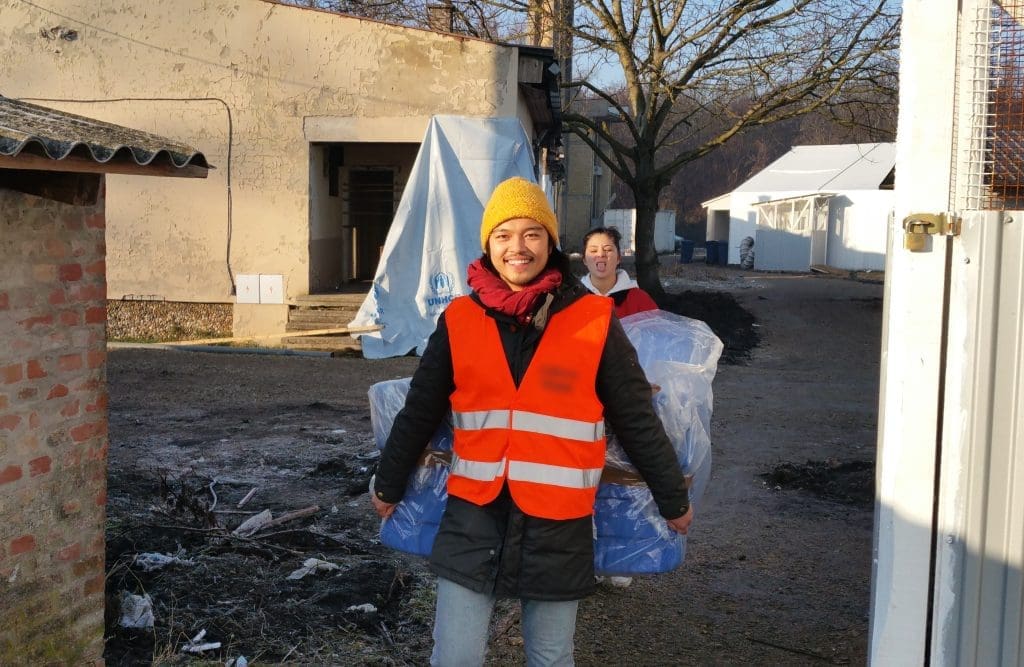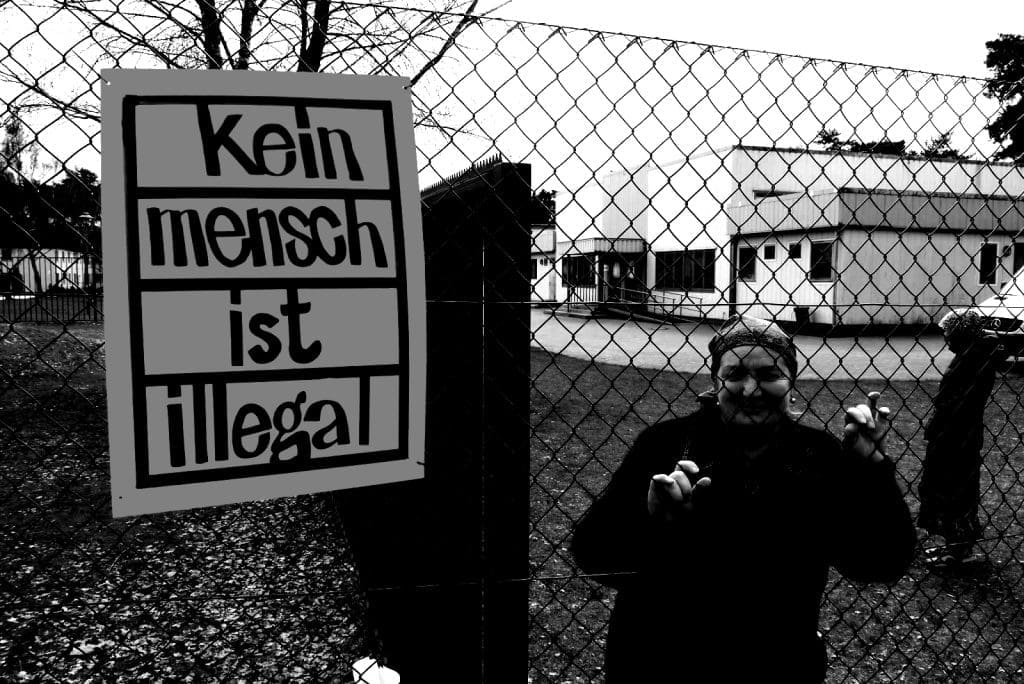The Freedom to Go Anywhere
Why global freedom of movement is not a utopian fantasy
Interview with philosopher Andreas Cassee by Papierlose Zeitung
13 June 2018 (original post in German)
Papierlose Zeitung: What is global freedom of movement?
Andreas Cassee: Global freedom of movement is a long term political project with the goal that all people can decide for themselves where they want to live.
Within the borders of liberal-democratic states, freedom of movement is already a recognized right. Whoever wants to move from Zurich to Bern does not have to demonstrate that they have been politically persecuted in Zurich or that they will somehow be especially useful to the residents of Bern. There is a codified human right to move around freely and reside where one likes within a country.
But anyone who wants to cross a nation-state’s border and immigrate to another country finds themselves in the role of supplicant. Prospective immigrants have to demonstrate their positive value (for example, “I am rich and will be a dutiful taxpayer!” or “I am educated and have skills that are urgently needed in your country!”). The right to immigrate to the country of their choice is not extended to them.
Global freedom of movement demands that this change. People should be able to decide freely which patch of Earth they want to live on, regardless of where they were born and which country they have “citizenship” in.
PZ: Why would that be a good thing?
AC: The constraints on immigration typical today are grossly unjust. First, they fly in the face of the idea of individual self-determination. The option of deciding where one resides is a central component of a self-determined life arrangement. Beyond that, it is a prerequisite for the exercise of many other important freedoms. If I cannot move freely, I also cannot establish a community or association with the people of my choosing, or take part in a demonstration somewhere else. Constraints on freedom of movement are therefore always constraints on the freedom of association, the freedom of assembly, and numerous other important freedoms.
Secondly, limits on immigration contribute to maintaining economic inequality. The geographic location where a person receives their income is today the most important indicator of how high or low this income will be. Around two-thirds of global income inequality is explained by this single factor. Limits on immigration prevent people from moving to a place where they would have better economic opportunities. Whoever is born with the “right” citizenship status therefore has much better life prospects than a person who drew a less fortuitous number in the birth lottery.
In order to overcome these injustices, we should recognize and codify global freedom of movement.
PZ: But without borders there can be no states.
AC: As long as there are individual states, there will be borders that determine which state is responsible for which section of the Earth’s surface. But there is no reason to assume that these borders must be “closed.” There are borders between the cantons of Switzerland, but these borders are open, and when Swiss people move to a new canton they can even participate in politics there. Something similar could apply to international borders.
PZ: But that’s unrealistic!
AC: Of course global freedom of movement is not something we can achieve overnight. And there are plenty of mechanisms in place that make the struggle for freedom of movement more difficult. Those who would benefit most from different migration policies—people without legal residency status, and people elsewhere who want to immigrate—have no political standing in the places they would need to exert influence. National politicians therefore have very little incentive to work for global freedom of movement.
But in the long term, the world is much more malleable than it ever seems from a contemporary perspective. During the Second World War, hardly anyone would have thought that someday there would be free movement of people between Germany and France. Also, intra-state freedom of movement is something that had to be fought for. In canton Zurich, for example, there were restrictions against “oversaturation” by “cantonal foreigners” from canton Aargau. Today it is taken for granted that people from Aargau can freely move to Zurich, and vice-versa. Thinking in longer arcs of time can help us avoid recoiling from “unrealistic” demands.
PZ: What about national culture?
AC: There is too much value placed in this anyway. What does an atheist punk in Lausanne have in common, culturally, with a Catholic from the Swiss heartland that sets them both apart from all other people in the world?
PZ: But not everyone can come here! If Switzerland suddenly opened its borders there would be chaos.
AC: There are many basic rights which, if they were exercised all at once by large numbers of people, could make for some problems. All people in Switzerland, for example, have the right to travel to the town of Andeer. If all of us exercised this right simultaneously, it would create a chaotic situation. If there were a medical emergency, rescuers wouldn’t be able to get through, for instance. But this is not grounds for us preemptively to curtail the right to move freely within this country. We only give the state the right to impose restrictions when, in isolated cases, it is an appropriate means to protect other rights.
The right to global freedom of movement is also not an absolute right. But this right can only be restricted to the extent that is necessary in upholding other basic rights. That the sudden immigration of several million people into Switzerland could lead to a collapse of public order is therefore not a valid reason to keep immigration restrictions at the level they’re at today. Besides, restrictions must be proportional and appropriate. In weighing these sorts of determinations, the interests and rights of those whose freedom of movement is being curtailed must also be taken into account. Is it “appropriate,” for example, to allow the deaths in the Mediterranean to continue simply in order to prevent a marginal deterioration of healthcare provision in Switzerland? Hardly. If the complete collapse of public order were in fact imminent, that’s a different situation. But we are a long way from that in Europe.
PZ: But freedom of movement is a neoliberal project!
AC: Neoliberals being for X is not a good reason to be against X. A stopped clock is right twice a day after all.
Regardless of that, neoliberals are rarely proponents of freedom of movement in practice. The neoliberal agenda is often mixed up with nationalist and neoconservative elements in order to make it palatable to more of the voting public.
If they were consistent, neoliberals would actually have to be for freedom of movement. The arguments they advance for the free movement of goods and capital should in fact speak to an interest also in the free movement of workforces. Some economists estimate that world GDP would double if people could work in the place where their work is most optimally productive. While the free movement of goods and capital benefits above all the wealthy, freedom of movement for people would be most useful for the less privileged first.
PZ: But only the wealthy can migrate anyway…
AC: The fact that migration is often only an option for the rich and well-educated has to do with there being no comprehensive right to freedom of movement. Legal paths to Europe are open only to the privileged, and irregular migration is expensive and risky. A right to freedom of movement would change that. A ticket for a flight or a ferry across the Mediterranean would only cost a fraction of what migrants pay a smuggler these days.
PZ: But the poorest of the poor who remain in countries with high emigration would suffer from the departure of well-educated workers.
AC: This argument is all too convenient for isolationists: “We keep the poor from our shores, but only to protect the poorest!”
This has very little to do with reality. Emigration has many positive effects for countries of origin. For example, migrants send a portion of their incomes back to relatives and friends in their country. These remittances are today around three times higher than worldwide state expenditures on development cooperation. Besides that, migration contributes to the spread of knowledge and information. Also, many migrants return eventually to their countries of origin in order to build something back home.
PZ: Still, there are problems. Think of the lack of medical personnel in many sub-Saharan African countries.
AC: That is true. But constraints on immigration are neither a fitting nor a fair method of solving these problems. There is no guarantee that doctors or nurses who are prevented from leaving are contributing to the basic medical needs of their countries in the slums or the countryside. Instead perhaps they work in exclusive private clinics in rich city neighborhoods, or have to supplement their incomes, for example, as taxi drivers. And it would be unfair to force doctors to work their whole lives in a slum simply because they were randomly born in a certain country. Instead of preventing people from migrating, working conditions and wages in the healthcare systems of these countries in question should be improved. This is indeed an additional responsibility of the Global North.
PZ: What about the welfare states in destination countries? Wouldn’t they come under intense pressure?
AC: That is a legitimate concern—which can nevertheless be eased, in a couple of ways. First of all, immigration is often only considered a danger to the welfare state in places where, bottom line, migrants are already paying more into the social system than they take out in the form of services. The idea that people want to move to another country simply to draw on social services is a myth.
Second, we should not submit to the illusion that migration is the essential reason that welfare states have come under pressure. A far greater problem is the mobility of capital and the concomitant race to the bottom in terms of taxes—something in which Switzerland has played an infamous role.
Ultimately we should set up social welfare systems in such a way that they are as compatible as possible with a right to global freedom of movement. For this, an international regulatory framework is surely needed. And we need this kind of framework either way, to curtail tax competition and prevent tax avoidance.
Translated by Antidote
Featured image source: Kai C. Schwarzer via Papierlose Zeitung

Andreas Cassee is a post-doctoral researcher at the University of Bern and author of Globale Bewegungsfreiheit: Ein philosophisches Plädoyer für offene Grenzen [Global Freedom of Movement: A Philosophical Call for Open Borders]; Frankfurt a.M.: Suhrkamp, 2016

Papierlose Zeitung is a refugee-run print and online newspaper in Zurich, Switzerland, a project of the Autonomous School of Zurich (ASZ)





